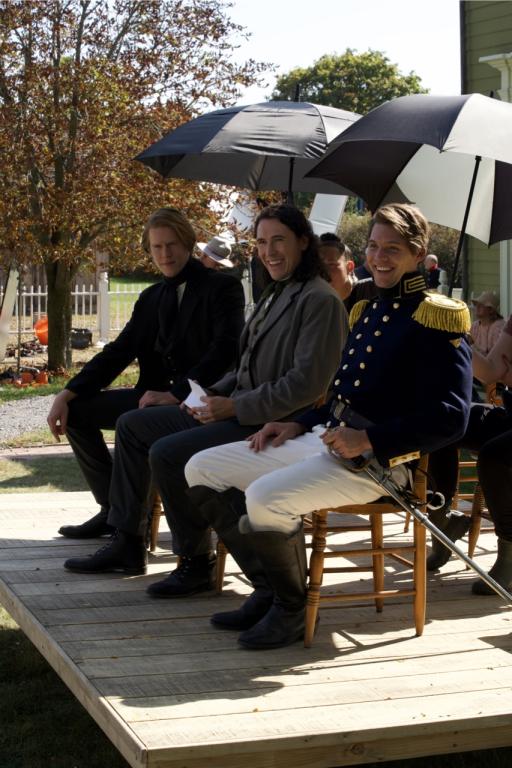
On 28 August 2024, I recorded a lecture in connection with the Interpreter Foundation’s approaching Mesoamerica tour. It was entitled “The Importance, and Non-Importance, of Knowing the Geography of the Book of Mormon,” and it is now up on the Interpreter Foundation website. Truth be told, it wasn’t one of my better outings — though it might still be preferable to an equivalent amount of time spent watching old reruns of The Young and the Restless or just about anything focused on the Kardashians.

Here are a few of the things that, I hope, people will sense about Brigham Young as the forthcoming Six Days in August movie project begins to unfold, starting with the premiere of the dramatic film on 10 October 2024, during the week following General Conference:
Together with the fairly large number of surviving holograph letters written after 1840, they [Brigham’s surviving diaries] reveal a man of tenderness, spiritual warmth, and insight, as well as the more commonly known Brigham of great energy and devotion.[1]
We will depict this, for example, in Brother Brigham’s tender care and affection for fatally ill first wife, Miriam Works, and in his experience as a single parent. I suspect that many Latter-day Saints are unaware of this side of him.
We will also represent his spirituality, which, as the late historian D. Michael Quinn wrote, has often been overlooked:
One of the recurring themes in non-Mormon biographies of President Brigham Young is the idea that he was not a very “spiritual” man. Such interpretations, however, not only misrepresent his character, they also totally disregard the evidence, both published and unpublished, that refutes such a stereotype.
On the day when Brigham first met the Prophet Joseph in November 1832, he surprised those he was with by speaking in tongues. We will show this. And that wasn’t the first time.
We will also illustrate his absolute faithfulness and commitment to the Prophet Joseph Smith:
It is quite evident that after 1832 Brigham Young was moved by one motive: Determination to obey the will of God as spoken thru the Prophet, and to support that Prophet with all that he possessed of time, talent, and means.[2]
An example of this that we don’t include in the movie
One time the Prophet Joseph Smith severely rebuked Brigham Young. After the Prophet’s chastisement, everyone in the room waited for Brigham’s response. He could have defended himself or been offended, but his reply was sincerely and simply, “Joseph, what do you want me to do?”[3]
As Irving Stone observes in his book Men to Match My Mountains, even the layout of Salt Lake City embodies Brigham’s fidelity to the Prophet:
Following Joseph Smith’s original design Young, the city planner, decreed that the streets were to be laid out enormously wide, each house set back so many feet, the fronts to be beautified with fruit trees and gardens; and four public squares of ten acres laid out in various parts of the city for public grounds.
The following is an excerpt from a dream that Brigham Young related to the Quorum of the Twelve on 17 February 1847, as recorded in his own handwriting and creative spelling:
I took him by the right hand and kist him meney times he looked perfically natureal, I asked him why it was that we could not be together as we used to live he had ben from us a long time and we wanted his Society and I due not like to be Seprated from him. he rose up from his chair looked at me with an ernest and plesent countenece, Spoak in his usual way [“]it is all right.[“] I then Said to him [“]I due not like to be a way from you.[“] [“]it is wright[,”] he replied [“]we cannot be together yet we Shall by en by but you will have to due with out me a while and then we Shall be together again.
On 29 August 1877 Brigham Young lay on his deathbed. His last words were: “Joseph! Joseph! Joseph!”
Did Joseph come for him? I strongly suspect that he did. In any case, it’s such evidence of Brigham’s devotion and loyalty to Joseph that makes it impossible for me to regard accusations that Brigham orchestrated the murder of Joseph and Hyrum Smith as anything other than offensive and, in fact, downright obscene. The real Brigham Young of history would never, ever, worlds without end, have lifted his hand against the man whom he venerated as the anointed of the Lord.
[1] Eugene England, Brother Brigham (Salt Lake City: Bookcraft, 1980), 14.
[2] S. Dilworth Young, “Here is Brigham . . .” Brigham Young . . . the years to 1844 (Salt Lake City: Bookcraft, 1964), Introduction.
[3] https://www.churchofjesuschrist.org/study/liahona/2003/02/did-you-know?lang=eng

(Wikimedia Commons public domain photo by Nick Allen)
I close with an item from Jeff Jacoby at the Boston Globe — a fundamentalist and theocratic rag if ever there was one! — that has obviously been drawn from the Christopher Hitchens Memorial “How Religion Poisons Everything” File™: “Religion is America’s mighty engine of charitable goodness: The federal government rightly characterizes faith-based organizations as ‘the bedrock of our society.’” If you can make it past the disgusting pro-religious propaganda, though, there is good news:
“Religious “nones,” as demographers call them, are markedly less likely to donate to charity or to volunteer their time than other Americans. None of us should be surprised that the dwindling of religion has been accompanied by a decline in charitable giving.
In other words, there is hope for the future! Imagine there’s no heaven. (It’s easy, if you try. No hell below us; above us, only sky. Imagine all the people living for today. Nothing to kill or die for, and no religion, too. Just imagine!













